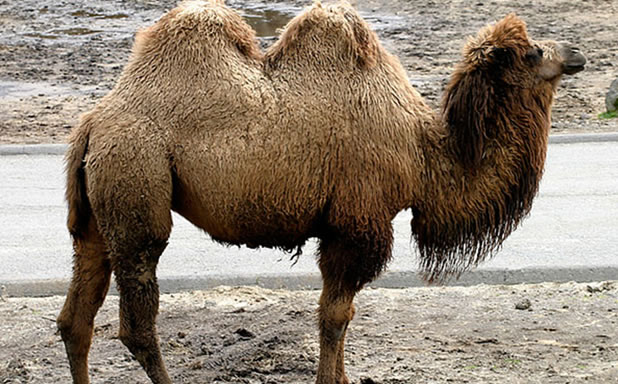Jul. 2007: “The camel does not see the bend in its neck.” – Arabic (Libya) Proverb
El dzamel ma ishbeh aouz rugupta. (Arabic)
The camel does not see the bend in its neck. (English)

Arabic (Libya) Proverb
Background, Explanation, Meaning and Everyday Use
The camel is the ship of the desert and the great Sahara Desert with the famous oases at Gabarahoon is right inside Libya and down south of Sebha. The Libyan camel is single humped (not like the Bactrian camel with two humps) and obtained in large numbers and domesticated for transportation, agriculture and meat. It is a part of the domestic, social and cultural life of the Arabs. The camel has a long neck which is curved concavely (i.e., with a hollow surface outside and an arch inward) and is perceived to be ugly by the Arabs. It is believed by the local people that a camel cannot see the bend in its neck.
Based on this assumption the local people have created a metaphorical proverb out of its bio-psychological behavior of not knowing its own defects and extended it to the fault-finding behavior of human beings. In Libyan society (especially in the Sebha Region where I have worked) this Arabic proverb is used to censure those people who find fault with others, but are oblivious to their own mistakes.
This proverb is in Libyan Spoken Arabic (also called Libyan Vernacular Arabic) and in Standard Arabic that is the national or official language of Libya. A variant that is not commonly heard is: A naga ma ta ishbeh aouz rogbath (A female camel cannot see the bend in her neck).
 Biblical Parallels
Biblical Parallels
“Do not judge, so that you may not be judged. For with the judgment you make you will be judged, and the measure you give will be the measure you get. Why do you see the speck in your neighbor’s eye, but do not notice the log in your own eye?” (Matthew 7:1-3)
Contemporary Use and Religious Application
It is considered to be ethically and religiously wrong for people to find fault with others when they themselves suffer from the same faults. In Christianity Jesus Christ himself set up the noblest example of forgiveness when he prayed to God to “forgive them for they know not what they do.” Such noble examples are found everywhere in the lives of noble men and women throughout the world. However, it is rarely practised by common people in real life situations. That is why in English we find such proverbs as physician heal thyself! The most important point is love, forgiveness and a humanitarian attitude towards our fellow human beings. “Love thy neighbor” and be “your brother’s keeper.”
It is the duty of a good human being to understand other people’s weakness and try to help them to get out of it by love and firmness, not by brainwashing or fault-finding or insulting. Ignorance is the mother of all evil. To be aware of what is right and what is wrong and to be good is the sum of ethical life. However, to bring about such an awareness and persuade people to be good is an extremely difficult job. One of the important factors to do so is to be first self disciplined. Charity begins at home. However much preaching a preacher does, it falls flat if it is not supported by example. Preaching becomes effective only if the preacher is noble. When a preacher is noble he or she needs to use examples, illustrations, and relevant proverbs to point out the problem and then encourage the hearer to strive to solve it.
In this connection using proverbs that contain images of animals serves an important purpose. They are indirect and so polite. They are socially accepted by the society and hence receive the cultural authority. They are graphic and so easily capture the imagination of the hearer.
Anger, greed, vanity, lust, envy, and addictions are very common weaknesses of human beings and they are present in people in varying degrees. When somebody who is a smoker or a drunkard tries to comment on another person’s weakness such as gambling or wastefulness; when someone who is ugly comments on someone else’s poor appearance; when a person insults others for being poor or small when the person himself or herself is so too, then this proverb is used.
Professor Chilukuri Bhuvaneswar
University of Sebha
Sebha, Libya
Current location: Hyderabad, India
Email: bhuvaneswarc@yahoo.co.in
